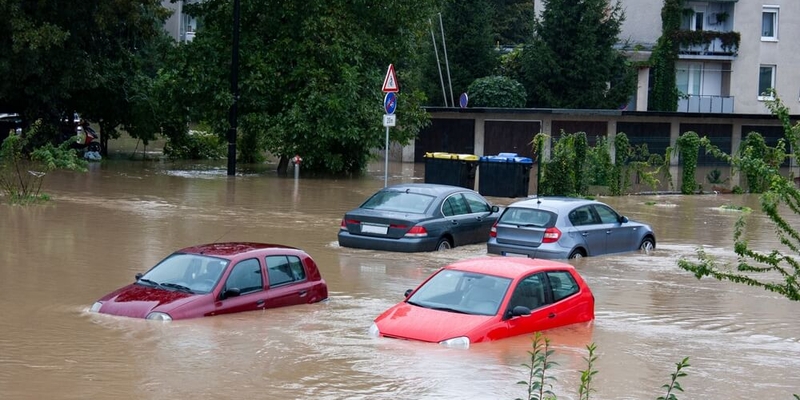
If you are not redirected within 30 seconds, please click here to continue.
Samedi: 10h – 16h HAE

If you are not redirected within 30 seconds, please click here to continue.
If you are not redirected within 30 seconds, please click here to continue.
Don't get scammed: How to avoid buying a flood-damaged car

With interest rates going down, many may be considering buying a car – new or used.
However, this past year’s devastating natural disasters and rampant vehicle theft have made buying a used car more complicated. Buyers need to be extra cautious as increasing fraudulent activities are on the rise.
According to Carfax, the hurricane season in the United States damaged as many as 347,000 vehicles. Thousands of these flood-damaged vehicles could wash up on Canadian shores, many miles away from the original incident to unsuspecting buyers.
Canadian buyers need to be more vigilant than ever as a water-damaged car can cause costly mechanical and electrical issues and failures and even pose health risks and safety issues.
Thousands of damaged cars are flooding the used car market
The scale of the problem is bigger than ever before. This past October, Hurricane Milton damaged 120,000 vehicles in Florida, while Hurricane Helene before that affected 138,000 vehicles across several U.S. states.
An additional 89,000 vehicles suffered water damage from smaller storms during the summer months. All these damaged vehicles have to go somewhere - The problem is that many of them have been overhauled to be redistributed across North America.
Buying a used car is not always straightforward as as it may seem. While some sellers are transparent about the car’s history, a few shadier characters may attempt to hide the car’s claims history. Water damage might not be apparent, but there can be serious issue upon use.
While there's no strict requirement for consumers to know a vehicle's complete history or previous claims, it's always advisable to obtain documentation. One way to do that is by getting a vehicle safety inspection done when purchasing your vehicle.
“While it is advisable to report any pre-existing damage to the insurance company, an insurer will not cover any loss occurring due to pre-existing damage to the vehicle,” says insurance broker and RATESDOTCA expert Daniel Ivans. “Checking the vehicle's Carfax report is recommended before buying a used vehicle.”
“However, if an accident occurs due to an unknown pre-existing condition -- such as electronic or engine issues that the buyer wasn't aware of -- the accident itself would be covered by insurance,” he adds.
Consumers often purchase used vehicles without complete knowledge of previous claims history. While identifying a flood-damaged vehicle can present challenges for the buyer, it is not impossible to avoid potential losses.
What to do before buying a used car
There's very little you can do if you spot signs of existing damage in your used car after you've bought it - but a lot you can do before you buy it. Here are just a few tips.
Check the car’s claims history
When buying a used vehicle, always request the seller for a comprehensive vehicle report history. You can use online flood-checkers, tools and databases to identify such vehicles. Cross-check the Vehicle Identification Number (VIN) with multiple sources before you pay for the vehicle.
Physical inspection red flags
Look for signs of water damage such as:
- Damp or musty carpets, especially if the interiors smell of excessive air freshener.
- New upholstery or mismatched interiors/upholstery. If the material doesn’t match the car’s overall wear and tear, that means it could have been hastily repaired.
- Rusty door frames, or rust in unusual places like under the dashboard, seat rails, on the pedals or in the hood and trunk latches.
- Mud or silt in compartments and under seats, inside the glovebox or around the engine.
- Brittle wiring under the dashboard
- Foggy headlamps or taillights could give you a clear picture if the vehicle has been under water. Turn on all the electronics in the car, including entertainment system, windshield wipers, dashboard lights, and interior lights. Electrical systems could fail first in a flood-damaged car.
Professional assessment
Have a trusted car mechanic thoroughly inspect of the car and request a detailed test drive. Getting a professional check the signs of VIN tampering could go a long way to help you avoid a headache and save big bucks later.
Document verification
You must spare quality time to carefully examine all ownership documents, seller’s identity and address, check all VIN numbers and insurance claims history.
If a deal appears too good to be true, it very likely is.
Read more: What happens if my car floods in underground parking?
Risks of driving a previously damaged vehicle
Driving a water-damaged vehicle could pose serious mechanical issues like engine failure, electrical problems like damage to electronic systems in the car, health risks such as mold and bacteria in hidden spaces, as well as structural damage such as rust and corrosion.
Besides, from an insurance perspective, a claim made to repair a pre-existing may not be addressed by the insurer.
“Any pre-existing damages would not be covered at any point,” Ivans says. “However, if a consumer has an accident as a result of pre-existing damage that they were not aware of, due to a challenge with the electronic system or engine, the accident would be covered by the insurance company.”
The increasing frequency of natural disasters and sophisticated car-theft schemes means buyers will have to do their due diligence before financially committing to a buying a used vehicle.
The process of thoroughly vetting a used car may seem unnerving at first, but it is far less a hassle than repairing a damaged vehicle out of pocket without insurance support.
Go with your instincts. If you smell something fishy, it might be because the car has slept with the fishes.
Related: Will my car insurance cover damage discovered after filing a claim
Don't waste time calling around for auto insurance
Use RATESDOTCA to shop around, and compare multiple quotes at the same time.
Get money-saving tips in your inbox.
Stay on top of personal finance tips from our money experts!









